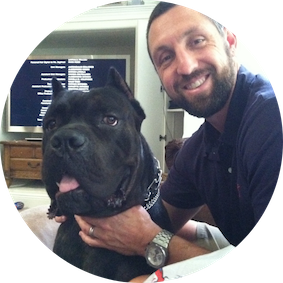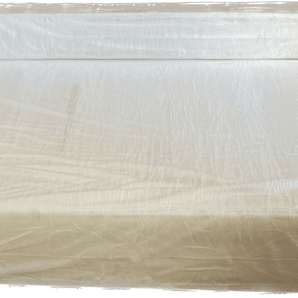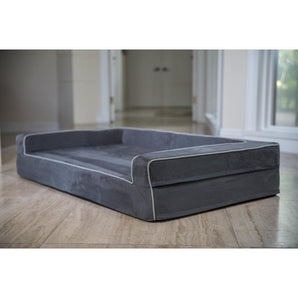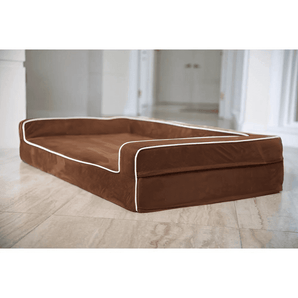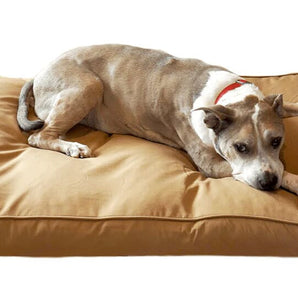Why do dogs drag their butts? Dogs do some gross things, and butt-scooting is one of those strange behaviors that can bewilder even the most experienced dog owners. Like most animal behaviors, though, there's usually a purpose behind your dog scooting his behind across your freshly cleaned carpets.
Dog Scooting Explained

The obvious reason for butt-scooting is that your canine companion is feeling itchy down there and wants to find relief, but figuring out the cause of the itching can be tricky. It could be due to simple skin irritation, but it may also indicate more serious anal sac issues that need to be addressed by a veterinarian.
Here are some reasons you may notice your dog scooting or dragging their butt.
Allergies and Skin Irritations
Dogs can develop allergies and skin irritations just like humans do. This could be due to your dog's diet, or it could be because of environmental changes. If you notice your dog dragging his butt across the floor or ground, assess whether anything has changed in their environment.
This could include things like:
- Switching to a New Food: Some dogs may develop food allergies, especially to certain grains like wheat or soy. Additives, preservatives, or artificial coloring can also cause allergic reactions. Look for dog foods with high-quality, natural ingredients.
- Irritation From Bedding: Using a new laundry detergent to launder your dog's bed or blankets may cause an allergic reaction. Additionally, certain fabrics or materials like wool or synthetic fibers may cause skin irritation. Choose bedding made with soft, non-hazardous materials to keep your dog comfortable while they rest.
- Using the Wrong Grooming Products: Over bathing or using harsh shampoos can strip your dog's skin of its natural oils, which can dryness and irritation. Follow your vet's instructions around frequency of bathing, and choose a mild dog shampoo made for sensitive skin.
- Seasonal Allergies: Dogs can develop environmental allergies to things like pollen, dust mites, or even mold. If you notice other signs of allergies, such as sneezing and scratching, environmental allergins may be to blame. You may need to keep your dog indoors during high-pollen days.
Issues With Your Dog's Anal Glands
Another common reason dogs drag their bottoms is a problem with their anal glands. If your dog's anal sacs are impacted, infected, or prolapsed, it can cause severe discomfort, leading your dog to seek relief through scooting.
Here's a closer look at what some of these issues may look like:
- Impacted Anal Glands: Impacted anal glands can occur when a dog poops and their sacs don't empty properly. This could be caused by insufficient fiber in their diet, which can lead to overly soft stools that don't expel fully.
- Infected Anal Glands: Impacted glands can turn into an infection when bacteria builds up in the trapped fecal matter, causing inflammation and itchiness. If you notice swelling, redness, or pus coming from your dog's anal anus, they may have an infection and should see a veterinarian.
- Rectal Prolapse: A rectal prolapse occurs when part of the rectum protrudes through the dog's anus. This condition usually occurs due to intestinal parasites, gastrointestinal disease, or an obstruction in the area. You can usually see the tissue, and it may look swollen or infected.
- Anal Sac Rupture: If issues such as an impacted or infected anal gland aren't treated, it may eventually lead to an anal sac rupture, which can be an incredibly painful and dangerous issue for your pup. If you notice a visible wound near the anus with discharge or a foul smell, schedule a vet visit right away.
If your dog has frequent anal sac issues, consider giving them a dietary supplement like an anal gland support chew to encourage healthy anal gland function and prevent scooting and dragging. If the problem persists, you may need to see a vet to have their anal glands expressed.
Intestinal Parasites and Worms
Dogs can get intestinal worms by ingesting worm eggs found in contaminated soil or feces from other dogs. This is unfortunately a fairly common occurrence, especially for pups who spend a lot of time outdoors where other dogs defecate, such as a dog park. Dog scooting is one of the many signs your dog has worms or parasites. Sometimes you can visibly see small tapeworm segments in your dog's poop. Other symptoms of worms may include changes in your dog's appetite or behavior.
You can help prevent this pesky problem by keeping their indoor and outdoor environments clean and free from feces, using a flea control medication (fleas are known to be carriers or worm eggs), and giving your dog a stool-eating deterrent.
Dietary Problems
Too much or not enough fiber can cause your dog to have digestive problems, leading to constipation or diarrhea—both of which can cause anal gland issues. Fiber adds bulk to the dog's stool and helps it pass through the digestive tract. A diet low in fiber can cause small, hard stools that are difficult for the dog to pass, whereas too much fiber can cause the opposite effect: diarrhea and watery stool that doesn't fully pass. Your veterinarian can help you adjust your dog’s diet so they’re getting the right balance of fiber.
Presence of Foreign Objects
Dogs eat some weird things—tennis balls, shoes, socks, and just about anything else they can get their paws on. They may also swallow pieces of string (or long hair if they're living with a human who sheds, too). When foreign objects get stuck in the digestive tract, your dog may start scooting or straining while trying to poop. Blockages such as these can cause more serious issues if they aren't addressed, so if you suspect your dog ingested something they shouldn't have, contact your veterinarian right away.
Tumors or Growths
Although rare, tumors or growths around the anal sacs may also be a cause of dog scooting or dragging. These tumors can be benign (non-cancerous) or malignant (cancerous), but both types can obstruct the anal sacs, causing pain and complications. In addition to scooting behavior, you might also notice lumps or deformities around the anus. Your dog may also show signs such as weight loss, lethargy, or decreased appetite.
Any time you suspect your dog has a tumor or growth, contact your veterinarian for a rectal exam. Prompt treatment can prevent serious complications and make all the difference in the outcome.
Poor Grooming or Hygiene
Dogs that aren't groomed properly, especially long-haired breeds, can get feces, dirt, and moisture trapped in matted hair around their anus. This can lead to bacterial infections, skin irritation, and persistent itching. Regular grooming and trimming, along with using pet-safe grooming shampoos, can easily prevent this problem. Many dog owners choose to have their pets professionally groomed, where the groomer can determine if it's necessary to have the dog's anal glands expressed to prevent irritation and infection.
Behavioral Issues
If there are no other obvious causes of your dog's dragging behavior, it could be a sign of a behavior issue. Some dogs with anxiety may engage in excessive licking, grooming, or scooting as a way to self-soothe. Other signs your dog may have anxiety can include aggressiveness, excessive barking, panting and pacing, or having accidents in the house.
When to See a Vet

If your dog scoots constantly, and grooming or addressing environmental allergens doesn't fix the issue, it's worth a trip to the veterinarian for further investigation. Your vet can do a rectal exam to rule out any serious issues.
If you notice any of the following signs in addition to dragging, call your veterinarian right away:
- visual protrusions or swelling of the anus
- whining, yelping, or trouble sitting
- blood or discharge in the stool
- difficulty defecating
- a foul odor
- unexplained weight loss or lethargy
Why Do Dogs Drag Their Butts?
Now you know there are numerous potential reasons behind your dog's scooting behavior. Sometimes, it may be as simple as needing to scratch an itch on their rear end, but other times it can be an indication of something more serious. In general, if the behavior occurs suddenly and doesn't stop after a day or two, you should investigate the problem more deeply so you can treat the cause. A healthy pup is a happy pup!

